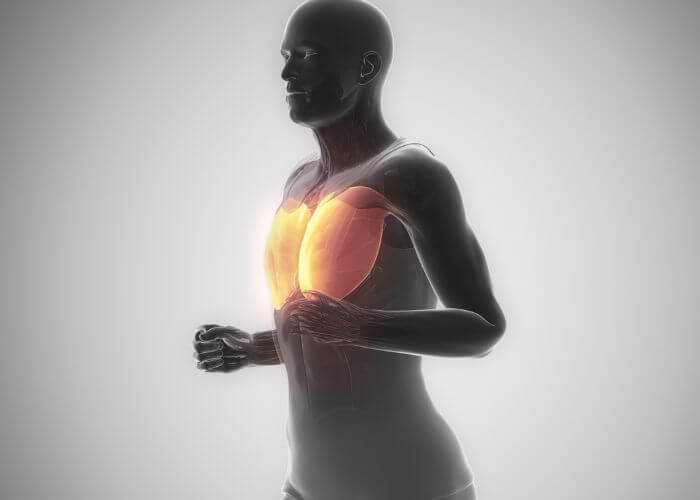What is a pectoralis major tendon tear?
The chest wall is lined with two types of large fan-shaped muscles: pectoralis major and pectoralis minor. These muscles provide strength and stability to the shoulder when lifting heavy objects. The pectoralis major muscle originates from the center of the sternum (chest) and clavicle (collarbone) and attaches to the humerus (upper arm) by the pectoralis major tendon. This muscle is the larger of the two “pecs” and is the most frequently injured of the two. Injury to the pectoralis major tendon occurs when the tendon is pulled away from its attachment site on the bone. Partial tendon tears involve only the sternal head of the pectoralis major tendon, whereas a complete tendon tear involves the clavicular head of the pectoralis major tendon as well. These types of injuries are often the result of sports-related activities with the most common occurrence among weightlifters. Dr. Answorth A. Allen, an orthopedic shoulder specialist serving patients in Manhattan, New York City, Westchester, Long Island and surrounding areas, has the knowledge and understanding, as well as substantial experience in treating patients who have experienced a partial or complete pectoralis major tendon tear.

What are the symptoms of a pectoralis major tendon tear?
Sudden and severe pain immediately following an injury is the most common complaint of a pectoralis major tendon tear. Other symptoms include:
- Obvious visual deformity of the chest wall muscle
- A “popping” sound or “snapping” sensation at the time of injury
- Decreased muscle strength, especially with arm movement
- Inflammation and bruising at the tendon attachment site
How is a pectoralis major tendon tear diagnosed?
X-rays are rarely helpful but magnetic resonance imaging (MRI) and ultrasound, are both very effective and may be needed to identify any other damage to the structures within the arm or chest wall.
After a comprehensive medical history and physical examination, Dr. Allen can categorize a pectoralis major tendon tear into one of the following four types:
Type 1: The pectoralis major tendon is separated from the humerus. This is a common injury and is often repaired surgically.
Type 2: The area where the pectoralis major muscle meets the tendon, the musculotendinous junction, is separated or strained. This is also a common injury and often repaired surgically.
Type 3: The tear has occurred within the pectoralis major muscle belly while the tendon remains fully intact.
Type 4: The pectoralis major tendon is separated from the sternocostal head.
What is the treatment for a pectoralis major tendon tear?
Non-surgical treatment:
Patients that have been diagnosed with a pectoralis major tendon strain are encouraged to avoid activities that initially caused the injury or exacerbate pain. Non-steroidal anti-inflammatory medications and ice application can help diminish the pain and inflammation.
Surgical treatment:
Surgical repair of Type 1 or Type 2 pectoralis major tendon tears is completed by reattaching the damaged tendon back to the correct anatomical insertion site on the humerus. A simple repair generally only requires special surgical anchors which are secured within the bone; however, a tendon transplant from the patient (autograft) or donor (allograft) may be needed for successful repair of more severe pectoralis major tendon tears. While performing this surgical procedure, Dr. Allen will be careful to protect the structures that lie in close proximity to the damaged tendon.
Pectoralis Tendon Specialist

Are you an athlete that participates in weight lifting activities? If so, you may be at an increased risk of sustaining an injury to the pectoralis major tendon. Tears to this tendon can cause decreased muscle strength and inflammation and can be repaired with surgery. Shoulder specialist Doctor Answorth Allen has experience diagnosing and treating patients in Manhattan, New York City, Westchester, Long Island and surrounding areas who have experienced a tear to the pectoralis major tendon. Contact Dr. Allen’s team today!






